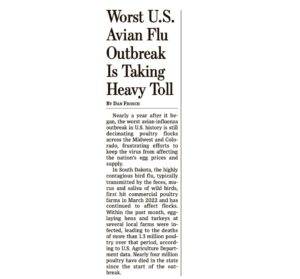The frustration in the room at Commodity Classic has been palpable following a year in 2025 where strong production was again unable to overcome swelling costs and expenses. Farmers here…
WSJ: “Worst U.S. Avian Flu Outbreak” Persists, “There is No Historical Context for This”
Dan Frosch reported in today’s Wall Street Journal that, “Nearly a year after it began, the worst avian-influenza outbreak in U.S. history is continuing to decimate poultry flocks across the Midwest and Colorado, frustrating efforts to keep the virus from affecting the nation’s egg prices and supply.”

The Journal article noted that, “‘One of the challenges is that we don’t know why it has been able to thrive for so long. We’re almost a full year into this outbreak and it is ongoing,’ said Maggie Baldwin, Colorado’s state veterinarian.”
Today’s article stated that, “People working on the problem say there is no easy way to stop the spread of bird flu. Instead, the virus must be allowed to run its course.
‘There is no historical context for this. It’s like when Covid hit for humans,’ said Mike Tincher, rehabilitation coordinator for Colorado’s Rocky Mountain Raptor Program.
“To keep bird flu from spreading, entire poultry flocks must be destroyed after an infection is confirmed. The outbreak has caused the deaths of nearly 58 million poultry in 47 states, according to U.S. Department of Agriculture data.”
All layers in the United States on January 1, 2023 totaled 373 million, down 5 percent from last year. https://t.co/WPLSKbNUOv @usda_nass pic.twitter.com/537ObUkxdx
— FarmPolicy (@FarmPolicy) January 20, 2023
Frosch explained that, “One facility in Colorado’s Weld County that had restocked with healthy hens after initially having to euthanize its flock because of the virus was struck again by an outbreak last month, said Bill Scebbi, executive director of the Colorado Egg Producers, which represents five family farms. The facility had to euthanize its new flock, Mr. Scebbi said.
“He said the flu has been destructive to Colorado’s egg industry, with farmers having to purchase eggs from out of state to meet customer demand. Egg farmers aren’t insured against the virus, Mr. Scebbi said, and estimated losses are in the millions.”
The Journal article added that, “Still, according to Emily Metz, president and chief executive of the American Egg Board, which represents egg producers, many farms around the country are recovering from the outbreak. There are currently about 6% fewer hens laying eggs than normal nationwide, she said.”





